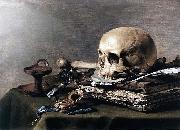
|
Barthel Bruyn
|
|||
|
|
|||
| 1493-1555 German German Renaissance painter, active in Cologne from 1515. Known especially for his portraits, which combine Northern realism with Italian-inspired monumentality and breadth, Bruyn also painted religious works such as the high altar at Essen Cathedral (1522). A portrait of a man and three religious works are in the Philadelphia Museum; many of his works are in Germany. | |||
|
|
|||
|
Vanitas Still Life Barthel Bruyn1.jpg Painting ID:: 256 |
Rijksmuseum Kroller-Muller, Otterlo | ||
|
|
|||
|
REMBRANDT Harmenszoon van Rijn
|
|||
|
|
|||
| Born 1606, Died 1669.One of the great Dutch painters and printmakers of the 17th century, Rembrandt van Rijn is best known for his expressive use of light and shadow (also called chiaroscuro) in his many portraits. Raised in Leiden, he studied with Pieter Lastman (1583-1633) in Amsterdam, then returned to Leiden around 1625 and set up shop as a teacher and portrait artist. Sometime between 1630 and 1632 Rembrandt relocated to Amsterdam, where he spent the rest of his career. Though he had his detractors (some of whom considered him coarse and "low born"), Rembrandt was successful and famous during his lifetime, though he fell on financial hard times in his later years. He was a master printer and produced hundreds of group portraits and historical paintings, including The Anatomy Lesson of Dr. Tulp (1632), The Military Company of Captain Frans Banning Cocq (1642) and Aristotle with a Bust of Homer (1653). His portraits -- including a lifelong trail of intriguing and rather frank self-portraits -- reveal his interest in psychological study and continue to be admired as landmarks in Western art. The Military Company of Captain Frans Banning Cocq is also known as "The Night Watch" because it was thought the painting depicted a nighttime scene. When the painting was cleaned in the 1940s it became obvious that it depicted a daytime scene... He married Saskia van Ulenburgh (also Uylenburgh) in 1634. | |||
|
|
|||
|
Vanitas Still Life new18/REMBRANDT Harmenszoon van Rijn-453477.jpg Painting ID:: 50234 |
mk210 about 1660 canvas 63.5x73cm | ||
|
|
|||
|
Evert Collier
|
|||
|
|
|||
| (c. 1640 - few days before September 8, 1708) was a Dutch painter known for vanitas still-life and trompe l'oeil paintings. His first name is sometimes spelled "Edward" or "Edwaert" or "Eduwaert" or "Edwart," and his last name is sometimes spelled "Colyer" or "Kollier". Evert Collier was born between 1630 and 1650 in Breda, Noord-Brabant, and died in 1708. He is believed to have trained in Haarlem, as his earliest paintings show the influence of Pieter Claesz and Vincent Laurensz van der Vinne. By 1667, he had moved to Leiden, where he became a member of the Guild of St. Luke in 1673. He moved to Amsterdam by 1686 and to London in 1693. He was buried September 8, 1708 at St. James's, Piccadilly. | |||
|
|
|||
|
Vanitas Still Life new24/Evert Collier-437897.jpg Painting ID:: 75839 |
Date 1705 Medium Oil on canvas Dimensions 98 ?? 124 cm (38.6 ?? 48.8 in) cyf | ||
|
|
|||
|
Pieter Claesz
|
|||
|
|
|||
| Dutch 1597-1660 Pieter Claesz Locations Dutch painter of German birth. He apparently spent his entire career in Haarlem, where he specialized in still-life paintings. Well over 100 works survive, dating from 1621 to 1660. Most of his pictures are dated and monogrammed PC. Since those initials were shared by the Antwerp still-life painter CLARA PEETERS, several attributions are disputed. | |||
|
|
|||
|
Vanitas still life new24/Pieter Claesz-977875.jpg Painting ID:: 80363 |
1630 Medium Oil on panel Dimensions 39.5 x 56 cm (15.6 x 22 in) cyf | ||
|
|
|||
|
Also Buy::. For Following Paintings / Artists / Products, Please Use Our Search Online: |











